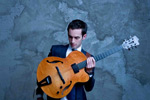
Julian Lage
|
|
JULIAN LAGE GROUP
The Van Dyck
Schenectady, NY
October 23, 2009
by J Hunter
I knew things were going to be interesting when I saw some of the backing instruments on the stage at the Van Dyck (The stage, by the way, is probably the only thing that hasn’t been changed in the new-and-greatly-improved performance space, back in business after a prolonged absence): There was a bass and a cello, and a “drum kit” that seemed to consist of two cymbals – one of them nearly bent into a right angle – hand drums of various shapes and sizes, and a wooden crate with “Booster Boxx” stenciled on the front. Whatever the Julian Lage Group was going to do, it was not going to be run-of-the-mill. Needless to say, I changed my seat so I could get a better look.
Lage (pronounced “lah-zhh”) started out in the clear, playing the opening to “Working Title” on an electric/acoustic guitar with an external mic strapped to the side of the instrument. The mic seemed to act as an ‘effects box”, giving the former Taylor Eigsti sideman a sound that was weird but wonderful. Lage’s lines seemed Middle Eastern in nature, but there was folk and flamenco in the mix, too, as he displayed a strumming technique that was absolutely superhuman. The band came in behind Lage, with alto saxman Ben Roseth playing a dizzying call & answer with cellist Aristedes Rivas before the two dove into some truly unearthly harmony.
Tupac Mantilla’s percussion was all hands and no sticks; he even kept time on the box he sat on – an Afro-Peruvian percussion instrument called a cajon! The effect was a slightly muted, textured sound, but Mantilla’s intensity was undeniable. I kept expecting him to start spraying blood like a Quentin Tarantino extra after one errant slash at the cymbals, but it never happened. The intricacy of the piece was mind-boggling as the band went from warp speed to dead slow in an instant, with Rivas “stepping forward” to knock us flat with his bowing. Even with “muffled” drums and an “acoustic” guitar, “Working Title” was never less than dynamic, especially when the speed picked up and Roseth’s bright, dancing out-solo grabbed us all.
Every piece that followed was the same as “Working Title”, in that none of the music moved in a straight line. The complexity of the music was Graduate School level, referencing Latin patterns one moment, classical chamber music the next, and blues (or something else) down the road, as the band casually changed “chapters” and time signatures on each piece. This applied to Lage’s unbelievable take on the standard “Li’l Darlin’”… Well, I assume it was “Li’l Darlin’.” Fellow albanyjazzers Al Brooks and Randy Treece were sitting in the back of the club, and they agreed with me afterwards that they couldn’t find a single recognizable phrase in the piece that could be applied to Count Basie, one of the major players who covered it. I postulated that if Basie himself had walked into the club during the performance, he would have said, “Cool tune, man! What’s it called?”
This was the pattern as Lage and his partners worked through several pieces from Sounding Point (eMarcy, 2009), his debut as a leader. Of course, when I say “worked”, that means the musicians got paid to play this music. (“We totally hate playing, by the way,” Lage cracked as he tuned his guitar, tongue firmly in cheek.) In fact, watching this set was like peeking in on a private jam session, where only the barest of musical frameworks applied, and nothing that happened was planned. Every band member wore a smile on his face that said This is just like stealing, and there were multiple points where one of the musicians played a line or a figure that drew louder howls of surprise and approval from the band than he got from the audience. During a hushed duet between Lage and bassist Jorge Roeder, Roseth sat next to Rivas and shook his head in wonder at the beauty that was unfolding in front of us all.
Lage spoke to us off-mic, giving the set an informal coffeehouse vibe, and the crowd had no compunction about talking back. When Lage mused that “This is a cool place to play”, a woman in the audience called out, “You sound great!” Lage thanked her, completely sincere. Everyone was in the groove, in the band and in the audience, all of us mesmerized by a entrancing, sensual sound that always surprised and refused to be predictable. For myself, I haven’t been this surprised by a band since I went to SPAC twenty years ago, when an unknown quartet called Béla Fleck and the Flecktones opened the Man Stage at the then-Newport Jazz Festival/Saratoga and blew us all away. The Julian Lage Group plays music that is equally indefinable, and equally as enjoyable. And with any luck, they’ll be baffling us with beauty for a good long while.
J HUNTER is a former announcer/producer for radio stations in the Capital Region and the Bay Area, including KSJS/San Jose (where he was Assistant Music Director/Jazz Programming) and Q104 WQBK/Albany. He is a frequent contributor to the web site All About Jazz and to the monthly music magazine State of Mind. He currently resides in Clifton Park.
|



